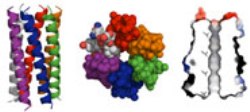Researchers, Professor Dek Woolfson, Dr Franziska Thomas and Dr David Fermin, from the University of Bristol’s School of Chemistry have received a Leverhulme Trust Research Project Grant worth £140,000.
 The structure of CC-Hex shown as a "cartoon" on the left, and as orthogonal views in the middle and the right showing all of the atoms in the molecule and the central channel. The channel is just half a nanometer across.
The structure of CC-Hex shown as a "cartoon" on the left, and as orthogonal views in the middle and the right showing all of the atoms in the molecule and the central channel. The channel is just half a nanometer across.
The three-year grant will be used to develop the functionalization, assembly and design of peptide nanotubes to synthesize nanothin metal wires. Recently, Woolfson in partnership with Professor Leo Brady and Professor Paula Booth from the School of Biochemistry has discovered a new type of peptides, which align as helical bundles with a channel in the center. These assemblies will be the molecular building blocks to develop the proposed peptide nanotubes. The discovery of CC-Hex was carried out at Woolfson’s lab.
Woolfson informed that the new protein structure, CC-Hex could act as a molecular building block for highly complicated and functional structures. For instance, the researchers are studying the possibilities of synthesizing ion-channel proteins and enzymes out of CC-Hex. The CC-Hex discovery was reported on October 30, 2011, in the journal, Nature Chemistry Biology.
Woolfson further said that the new grant will help the researchers to assemble semiconductor and metal wires on a scale of nearly 1/1000 of a human hair. The researchers want to see the possibility of building small electronic devices and circuits using this fundamental bio-inspired approach.
The Leverhulme Trust, founded in 1925, provides research funding for all subjects in the United Kingdom. The trust offers funds with a total value of nearly £60 million each year.